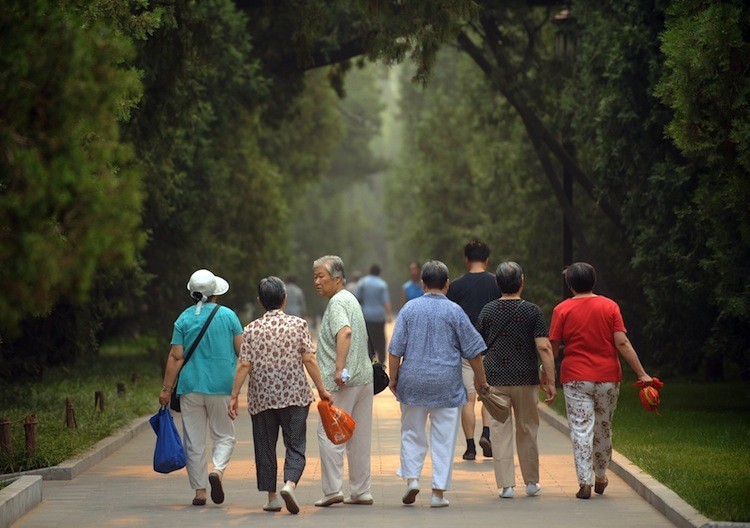


(File photo)
BEIJING, Dec. 10 -- China's population is aging at a historical high, setting the government with the arduous task of providing balanced care for a growing number of senior citizens.
The country was found to have the fastest aging population among countries around East Asia and the Pacific in a recent report by the World Bank, which said China's population is growing old faster than any other region in history.
People aged over 65 years old account for more than 10 percent of China's total population, compared with the standard 7 percent used globally to identify an aging society.
But geriatric-care services lag far behind the increasing demand and face unbalanced development between regions.
By the end of 2014, China had 5.51 million nursing beds for the elderly, an average of around 26 beds for every 1,000 old people.
The Ministry of Civil Affairs has promised to accelerate the development of care services and increase the number of beds to 30 for every 1,000 old people by the end of 2015.
At present, high-quality public elderly care centers are extremely hard to gain admission to. People wait for years or even decades to get into popular nursing homes with high service standards.
However, 48 percent of nursing beds were not occupied by the end of last year, and only 19.4 percent of elderly nursing homes were making profits, according to a report released in July.
Some nursing homes in Beijing's suburbs see beds remain empty due to the long distance from old people's homes and lack of medical services.
Another problem is that half of the country's elderly people live in rural areas, but about 70 percent of elderly care institutions are in cities. Thus, China has a long way to go to meet the needs of rural residents.
Philip O'Keefe, leading author of the World Bank report, said governments should help society adapt to rapid aging and promote healthy and productive aging.
The report recommended the government develop affordable models of elderly care that combine family support with home-based community and nursing approaches.
The Chinese government has been guiding private capital into elderly care sector since 2012 to better suit market demand, unveiling support policies for financing, land supply, tax preferences and subsidies for elderly care service providers.
But private investors still face barriers, partly due to high costs and slow approval procedures, Xinhua's latest survey showed.
The combined cost of land use and construction for setting up a nursing home is usually between 1 and 10 million yuan (1.56 million U.S. dollars), a high threshold for private investors.
Wu Yushao, director of the China Research Center on Aging, said the country should better support development of old-age care institutions, especially small and medium-sized ones, and encourage domestic and overseas capital to participate in old-age care.
The government should also make full use of its public service resources in serving its old people, including existing facilities for old-age care, medical treatment and education, he said.
The World Bank said that changes need to be made concerning how health providers are paid and cultivating a new health work force that can provide good-quality care services.
 Chinese beauty with sexiest bottom
Chinese beauty with sexiest bottom All-star Carnival held in Beijing
All-star Carnival held in Beijing Charming female bodybuilders of Chengdu University
Charming female bodybuilders of Chengdu University Polish sports stars strip off for risqué calendar
Polish sports stars strip off for risqué calendar Spectacular aerial photos of the Three Gorges
Spectacular aerial photos of the Three Gorges Contestants of Mrs. Globe pose for photo in Shenzhen
Contestants of Mrs. Globe pose for photo in Shenzhen
 Bikini models attend hot pot banquet in Hefei
Bikini models attend hot pot banquet in Hefei J-10B fighters with homegrown engine in test fligh
J-10B fighters with homegrown engine in test fligh Photos of U.S. Navy intruding in South China Sea released
Photos of U.S. Navy intruding in South China Sea released Top 20 hottest women in the world in 2014
Top 20 hottest women in the world in 2014 Top 10 hardest languages to learn
Top 10 hardest languages to learn 10 Chinese female stars with most beautiful faces
10 Chinese female stars with most beautiful faces China’s Top 10 Unique Bridges, Highways and Roads
China’s Top 10 Unique Bridges, Highways and RoadsDay|Week